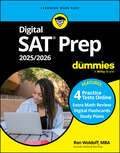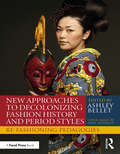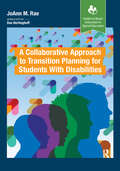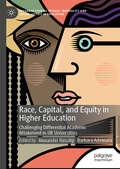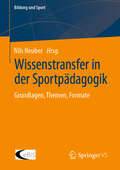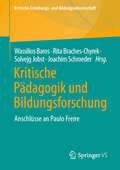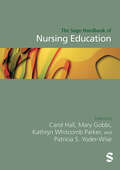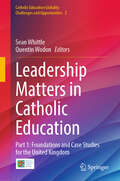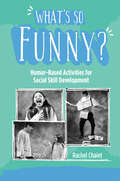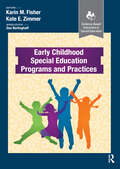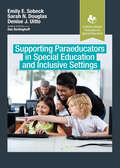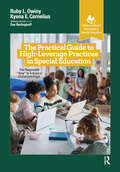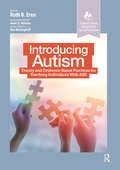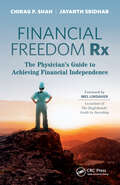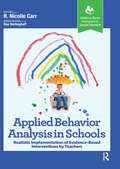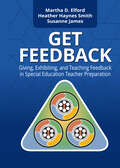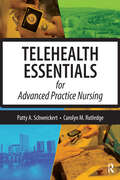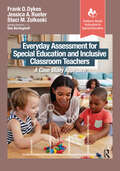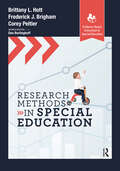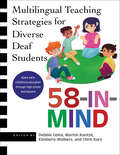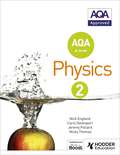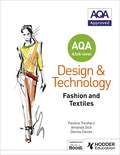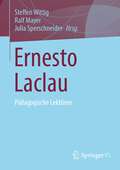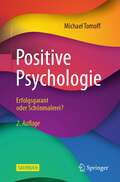- Table View
- List View
Digital SAT Prep 2025/2026 For Dummies: Book + 4 Practice Tests + Flashcards Online
by Ron WoldoffGet the score you need to land scholarships and get into the school of your dreams The SAT is a crucial step in the college admissions process, and a high score can put you on the road to the future you're dreaming of. Digital SAT Prep 2025/2026 For Dummies gives you the building blocks you need to take the test with confidence. First, get a primer on all the concepts tested on the SAT and find handy strategies for test day to boost your score. Then, apply what you've learned, with four practice tests online, complete with detailed answer explanations. New digital flashcards quiz you on your math and verbal skills, and detailed study plans help you stay on track. With this no-nonsense Dummies guide, you have everything you need to knock the SAT out of the park. Get clear explanations of all the content on the digital SAT, plus practice questions with answer explanations Quiz your heart out with 4 full-length practice tests and flashcards online Follow a customizable study plan, so you know you're making the most of the time you have left before the test Improve your chances of getting into your top-choice colleges with a high SAT score Digital SAT Prep 2025/2026 For Dummies is for anyone looking for that extra edge on this all-important college entrance exam.
New Approaches to Decolonizing Fashion History and Period Styles: Re-Fashioning Pedagogies
by Ashley BelletNew Approaches to Decolonizing Fashion History and Period Styles: Re-Fashioning Pedagogies offers a wide array of inclusive, global, practical approaches for teaching costume and fashion history.Costume designers, technicians, and historians have spent the last several years re-evaluating how they teach costume and fashion history, acknowledging the need to refocus the discourse to include a more global perspective. This book is a collection of pedagogical methods aimed to do just that, with an emphasis on easy reference, accessible activities, and rubrics, and containing a variety of ways to restructure the course. Each chapter offers a course description, syllabus calendar, course objectives, and learning outcomes, as well as sample activities from instructors across the country who have made major changes to their coursework. Using a combination of personal narratives, examples from their work, bibliographies of helpful texts, and student responses, contributors suggest a variety of ways to decolonize the traditionally Western-focused fashion history syllabus.This collection of pedagogical approaches is intended to support and inspire instructors teaching costume design, costume history, fashion history, period styles, and other aesthetic histories in the arts.
A Collaborative Approach to Transition Planning for Students with Disabilities (Evidence-Based Instruction in Special Education)
by JoAnn M. RaeA Collaborative Approach to Transition Planning for Students with Disabilities is designed to inform aspiring special education teachers, special education teams, transition planning specialists and school administrators about the complex process of transition planning and to meet the transition requirements of special education legislation. Author Dr. JoAnn Rae has been in the field of special education for 34 years, in service as a special education teacher, special education administrator, teacher certification supervisor and as college faculty. The framework she outlines is specially designed to advance students’ involvement and participation in their lives, not only in the presence of the most severe sensory and intellectual disabilities, but also in the case of multiple disabilities. Unique scenarios not typically seen in other textbooks, such as IEP team disagreements, students with terminal illnesses, students with ill or overworked parents or students living in poverty are also explored. The text also includes: Descriptions of research-based practices to maximize students’ self-determination, autonomy, goal setting and ability to have successful life experiences Opportunities to integrate knowledge with practice by providing strategies that relate to the real-life difficulties students and transition planning specialists may encounter Easy-to-replicate communication tools, such as letters to students and parents, as examples to enhance collaboration Methods for teachers to effectively promote and increase student involvement and collaboration by using structured and interactive interviews A Collaborative Approach to Transition Planning for Students with Disabilities reflects the universal challenges that teachers, families and finally, the students themselves face, as they progress through school with a disability. For students with disabilities, the key component to successful transition planning is creating a collaborative atmosphere that allows them to be successful. This book promises to serve as an essential resource to all who are dedicated to that goal.
Race, Capital, and Equity in Higher Education: Challenging Differential Academic Attainment in UK Universities (Palgrave Studies in Race, Inequality and Social Justice in Education)
by Alexander Hensby Barbara AdewumiThis book examines the structural and cultural factors that explain the persistence of an attainment gap between white and Black, Asian, and Minority Ethnic (BAME) students in UK universities. So-called ‘deficit’ approaches have long represented the orthodoxy in higher education strategy-making, yet they overlook the structural and institutional factors that reproduce attainment gaps. Whereas students already in possession of the right ‘academic capital’ are made to feel validated and empowered in their learning, BAME students – particularly those from working class backgrounds – may feel marginalised by dominant hierarchical cultures on campus.This book provides an important and unique contribution to the study of racial equity in higher education. Its chapters provide a breadth and depth of analyses which help explain the roots of the attainment gap, while offering reflections and commentaries on the necessary steps that universities must take in order to ensure equityfor students from all backgrounds.
Wissenstransfer in der Sportpädagogik: Grundlagen, Themen, Formate (Bildung und Sport #34)
by Nils NeuberForschung und Lehre gelten gemeinhin als die zentralen Aufgaben von Universitäten. In den letzten Jahren kommt als „Third Mission“ der Transfer akademischen Wissens in die Praxis hinzu. Dafür mangelt es jedoch oft noch an Konzepten und Formaten. Das gilt auch für die Sportwissenschaft im Allgemeinen und die Sportpädagogik im Besonderen. Vor diesem Hintergrund werden mit dem Band Grundlagen, Themen und Formate sportpädagogischer Transferaktivitäten zusammengetragen und systematisiert.
Kritische Pädagogik und Bildungsforschung: Anschlüsse an Paulo Freire (Kritische Erziehungs- und Bildungswissenschaft)
by Rita Braches-Chyrek Joachim Schroeder Wassilios Baros Solvejg JobstDer Band greift theoretische und methodische Ansätze Paulo Freires auf, dessen Kampf für Gerechtigkeit und Solidarität beispielhaft für eine radikale Kritik am bestehenden, postkolonialen neoliberalen System ist. In der Auseinandersetzung mit Freires Position der kritischen Erziehungswissenschaft eröffnen sich neue, die bisherigen Grenzen überschreitende Möglichkeiten.
The Sage Handbook of Nursing Education
by Carol Hall Patricia S. Yoder-Wise Mary Gobbi Kathryn Whitcomb ParkerIn the past several years, a revival of research devoted to nursing education has emerged. This emergence has changed the way many educators engage in their practice of working with learners; and learners have come to expect that they will have a rich learning experience designed to develop new (or enhance prior) knowledge, skills, and attitudes. The SAGE Handbook of Nursing Education provides a detailed map of the current discipline, with a carefully selected team of international contributors offering the latest thinking about education in nursing across key areas. This handbook will be a key resource for academic educators, as well as graduate and postgraduate learners.
The Sage Handbook of Nursing Education
by Carol Hall Patricia S. Yoder-Wise Mary Gobbi Kathryn Whitcomb ParkerIn the past several years, a revival of research devoted to nursing education has emerged. This emergence has changed the way many educators engage in their practice of working with learners; and learners have come to expect that they will have a rich learning experience designed to develop new (or enhance prior) knowledge, skills, and attitudes. The SAGE Handbook of Nursing Education provides a detailed map of the current discipline, with a carefully selected team of international contributors offering the latest thinking about education in nursing across key areas. This handbook will be a key resource for academic educators, as well as graduate and postgraduate learners.
Leadership Matters in Catholic Education: Part 1: Foundations and Case Studies for the United Kingdom (Catholic Education Globally: Challenges and Opportunities #2)
by Quentin Wodon Sean WhittleThis edited collection is the first part of a two-volume set., which focuses on leadership in Catholic education settings in the United Kingdom. It includes an overview of the importance of different types of leadership, including ‘servant-leadership’, in understanding and framing Catholic school practice, a critical survey of why leadership matters to ensuring the success of Catholic education, and a discussion of what counts as the defining characteristics of leadership in Catholic education and how this relates to the aims or philosophy of Catholic education. The chapters in this book draw from the insights and experiences of serving Catholic school leaders as well as from academics and researchers in Catholic education studies. The final two chapters provide a comparative analysis for the United Kingdom in a global perspective using data from the Organisation for Economic Co-operation and Development (OECD) . Together, the chapters argue that there is an urgent need to find, nurture, and sustain outstanding leaders for Catholic schools and colleges.
What's So Funny?: Humor-Based Activities for Social Skill Development
by Rachel ChaietWith ready-to-use lessons and strategies, What’s So Funny?: Humor-Based Activities for Social Skill Development provides readers with tools to help their clients improve their emotional intelligence through humor. Occupational therapists, speech-language pathologists, special educators, behavior therapists, and caregivers will benefit from the implementation of these strategies.What’s So Funny? contains a curriculum of more than 50 activities that emphasize two main ideas. The first is that humor (linguistic or physical) can be taught to many individuals with autism spectrum disorder or other disorders through explicit instruction, exposure to various types of humor, and embracing the individual’s preferred sense of humor. The second is that humorous activities can be used to increase social engagement, which can sometimes be a challenge for those with developmental disabilities.What’s So Funny? includes activities essential for individuals who: Appear to have a very limited concept or basic developmental level of humor Need to improve their understanding of socially appropriate humor Lack understanding of appropriate times to use humor Are nonverbal, have limited expressive communication skills, or use augmentative communication devices Have a difficult time initiating social interactions with their peers With a flexible program that can be used for either small groups or individuals from ages 7 years to adult, What’s So Funny?: Humor-Based Activities for Social Skill Development is a relevant and easy-to-use resource. Discussing a variety of types of humor on different developmental levels, from slapstick to word play, this program improves participants’ abilities to connect and engage with others through the powerful tool of humor.
Early Childhood Special Education Programs and Practices (Evidence-Based Instruction in Special Education)
by Karin Fisher Kate ZimmerEarly Childhood Special Education Programs and Practices is a special education textbook that prepares pre- and in-service teachers with the knowledge, skills, and dispositions to deliver evidence-based instruction to promote positive academic and behavioral outcomes for young children (prekindergarten through second grade) with development delays and/or disabilities.Early Childhood Special Education Programs and Practices intertwines inclusive early childhood practices by using real-life anecdotes to illustrate evidence-based practices (EBPs) and procedures. The authors, experts in their fields, emphasize high-leverage practices, EBPs, and culturally sustaining pedagogy and align them with the practices, skills, and competencies recommended by the Council for Exceptional Children’s Division for Early Childhood. Families, administrators, and teacher educators of pre- and in-service early childhood special education and general early childhood education programs alike will find this book useful.Included in Early Childhood Special Education Programs and Practices are: An overview of early childhood and development of children ages 4 to 8 Strategies for relationship building with students, families, communities, and school personnel Tips on creating a caring and positive classroom environment Chapters devoted to evidence-based instruction in core subjects of reading and writing, mathematics, science, and social studies for students with disabilities in pre-K to second grade More than 80 images, photos, tables, graphs, and case studies to illustrate recommended Practices Also included with the text are online supplemental materials for faculty use in the classroom, consisting of an Instructor’s Manual and PowerPoint slides.Created with the needs of early childhood special educators in mind, Early Childhood Special Education Programs and Practices provides pre- and in-service teachers with the skills and practices they need to serve young children, their families, and communities across settings.
Supporting Paraeducators in Special Education and Inclusive Settings (Evidence-Based Instruction in Special Education)
by Sarah Douglas Emily Sobeck Denise UittoSupporting Paraeducators in Special Education and Inclusive Settings provides an in-depth look at the role of pre- and in-service teachers as supervisors of paraeducators within special education and inclusive settings.The latest entry within the Evidence-Based Instruction in Special Education series, Supporting Paraeducators in Special Education and Inclusive Settings serves as an instructional tool for pre-service teachers and educators within higher education coursework, as well as a resource for in-service teachers. This text supports teachers in strengthening their knowledge and supervisory skills necessary to supervise and manage paraeducators in educational environments.Through objectives, scenarios, content, and chapter questions, Drs. Sobeck, Douglas, and Uitto provide a thorough and applicable overview of working with and supervising paraeducators. In this text the roles and responsibilities of paraeducators, teachers, and school administrators relative to paraeducator training and supervision will be detailed, as well as tips for collaboration.Included with the text are online supplemental materials for faculty use. School leaders and higher education faculty can use the online site for materials to support pre-service training within teacher preparation programs and professional development for in-service teachers.Supporting Paraeducators in Special Education and Inclusive Settings fills an important need in the field and is a vital resource for current and future teachers when working with paraeducators.
The Practical Guide to High-Leverage Practices in Special Education: The Purposeful “How” to Enhance Classroom Rigor (Evidence-Based Instruction in Special Education)
by Ruby L. Owiny Kyena CorneliusDesigned for teacher preparation programs as well as teacher professional development, The Practical Guide to High-Leverage Practices in Special Education: The Purposeful “How” to Enhance Classroom Rigor is the first book of its kind to introduce multiple HLPs working in tandem to implement evidence-based practices (EBPs).The Practical Guide to High-Leverage Practices in Special Education is a powerful tool for those dedicated to improving student outcomes. Planned with the practitioner in mind, the text’s main objective is for teachers to recognize EBPs as “what” they teach and HLPs as “how” they teach. The book is written with a focus on inclusive education, making it a valuable resource for both general and special educators.What’s included in The Practical Guide to High-Leverage Practices in Special Education: A focus on one HLP per chapter and descriptions of connected HLPs and how to use them for implementing featured EBPs Classroom scenarios for both elementary and secondary classrooms Tables of the crosswalks of connected HLPs and EBPs with resources forfurther learning The Practical Guide to High-Leverage Practices in Special Education: The Purposeful “How” to Enhance Classroom Rigor provides educators with the understanding of how HLPs and EBPs connect to effectively implement them for student success and is also an effective teaching and learning tool for teacher education preparation programs.
Introducing Autism: Theory and Evidence-Based Practices for Teaching Individuals with ASD (Evidence-Based Instruction in Special Education)
by Ruth ErenWritten by educators for educators, Introducing Autism: Theory and Evidence-Based Practices for Teaching Individuals With ASD is an introductory text offering a broad picture of Autism Spectrum Disorder for students, teachers, related service providers, and other school personnel who are engaged in the education of individuals with ASD.Introducing Autism imparts knowledge and understanding of the broad spectrum of ASD and suggests evidence-based practices to support this population. Editor Dr. Ruth Eren and the text contributors provide readers with a firm foundation of facts, strategies, and processes that help explain and address the complex profile of an individual with ASD. As a result of this understanding, current and future practitioners will be equipped with the skills and strategies to work collaboratively and effectively with their school team as they create a program for a student on the spectrum.What’s included in Introducing Autism: Content supported by case studies based in authentic educational settings Evidence-based practices suggested for use in the classroom Voices from the Spectrum sections in each chapter which feature the viewpoints from individuals on the spectrum Introducing Autism: Theory and Evidence-Based Practices for Teaching Individuals With ASD will enable universities to offer a comprehensive course that provides a strong foundation of knowledge and understanding of ASD to prepare teachers and related service providers for certification.
Financial Freedom Rx: The Physician’s Guide to Achieving Financial Independence
by Chirag Shah Jayanth Sridhar"The best physician-specific general financial book published in 2021." —James M. Dahle, MD, author of The White Coat InvestorA step-by-step guidebook for doctors and other medical professionals about growing and preserving wealth, Financial Freedom Rx: The Physician’s Guide to Achieving Financial Independence gives physicians all the tools necessary to manage their own finances and includes a foreword by Mel Lindauer, co-author of The Bogleheads' Guide to Investing. Medical professionals, especially doctors, spend many years in training as they accumulate debt and delay their earnings. This book presents a time-tested formula that students and established professionals can follow at any stage during their careers to achieve fiscal peace of mind. Students will learn how to budget and adopt disciplined financial practices. Residents and other trainees will learn how to defend against calamity with various insurances and how to manage debt. Junior professionals will acquire the skills needed to invest and grow their portfolios, while senior professionals will better understand the essentials of estate planning and retirement. Drs. Chirag P. Shah and Jayanth Sridhar wrote this inspiring text to guide physicians where to put their next dollar. This is particularly important during the financial uncertainties brought on by COVID-19 and insurance cuts. Financial Freedom Rx sets forth principles that will pilot medical professionals toward financial independence. Chapters include useful advice on topics such as: Financial planning Investing and asset allocation Jobs and contracts Taxes and insurance Student loans and debt Retirement savings and distributions Financial Freedom Rx: The Physician’s Guide to Achieving Financial Independence serves as a timeless blueprint for financial planning that medical professionals will follow throughout their careers, and as a reference that readers will revisit again and again as they progress through the various stages of life.
Applied Behavior Analysis in Schools: Realistic Implementation of Evidence-Based Interventions by Teachers (Evidence-Based Instruction in Special Education)
by R. CarrMost applied behavior analysis (ABA) texts rely heavily on research findings and technical theory, making them inaccessible for use by everyday teachers. Applied Behavior Analysis in Schools: Realistic Implementation of Evidence-Based Interventions by Teachers aims to be the missing link between books on classroom interventions within teacher preparation programs. Dr. R. Nicolle Carr leverages her years of expertise with ABA and channels it into creating practical, realistic working models of ABA that any teacher can use. Her “by teachers, for teachers” approach to writing effectively outlines ABA strategies so that they can be used with few resources and minimal training. Applied Behavior Analysis in Schools is tailored toward future and current educators to enable them to learn invaluable tools like how to effectively take data in a classroom to help with academic performance or behavior management—without requiring them to possess a background in ABA. What’s included in Applied Behavior Analysis in Schools:• Chapters on Acceptance and Commitment Therapy• The role of cultural considerations and collaboration skills• Use of ABA in transition skills• Applying ABA to academics and an overview of assessmentsIncluded with the text are online supplemental materials for faculty use in the classroom. Applied Behavior Analysis in Schools: Realistic Implementation of Evidence-Based Interventions by Teachers takes the concepts of ABA and presents them to teachers in a way that is both approachable and applicable.
GET Feedback: Giving, Exhibiting, and Teaching Feedback in Special Education Teacher Preparation
by Susanne James Heather Smith Martha Elford“A powerful and rich resource of great ideas that will move the debates about feedback into the most worthwhile areas."—John Hattie, PhD, University of Melbourne, Victoria, AustraliaPerfect for special education teacher preparation faculty, coordinators, and administrators, GET Feedbackprovides examples, activities, and support for integrating and aligning feedback instruction, demonstrating the importance of putting the adult learner, as the feedback recipient, at the center of every feedback opportunity. Written in an approachable, easy-to-read format, this text is the first book to specifically examine feedback for adult learners. Drs. Martha D. Elford, Heather Haynes Smith, and Susanne James use the G.E.T. Model (give, exhibit, teach) to provide structure for feedback through four domains: specificity, immediacy, purposefulness, and constructiveness.GET Feedback combines Adult Learning Theory with education research to provide a comprehensive, integrated framework to teach feedback in special education teacher preparation. This text will improve how special education teacher educators “GET” feedback across courses and programs.
Telehealth Essentials for Advanced Practice Nursing
by Patricia Schweickert Carolyn RutledgeA timely, practical, and concise resource for advanced practice registered nursing (APRN) students, faculty, and providers, Telehealth Essentials for Advanced Practice Nursing provides readers with an understanding of and tools to embrace the emerging field of telehealth and optimize its application in clinical practice. Telehealth offers a unique solution to many health-care challenges, such as provider shortages, chronic disease management, an aging population, protection from infectious disease, and limited access to care. As telehealth is being incorporated into health care and health care delivery at an ever-increasing rate, APRNs that can navigate the telehealth arena are uniquely positioned to serve as leaders in the health care of the future. Using Telehealth Essentials for Advanced Practice Nursing, readers will learn how to utilize telehealth to provide new and innovative methods of care.Authors Patty A. Schweickert and Carolyn M. Rutledge present a multi-modal approach to telehealth education that layers telehealth onto nurses’ existing knowledge of nursing practice. The text begins with the history and basics of telehealth before moving on to critical content that a provider must understand to maximize its use in the health care arena, covering topics including: Technology used in the early response to infectious diseases such as COVID-19 The process of integrating telehealth in practice Laws, policies, and regulations governing telehealth practice Barriers to implementation and strategies for overcoming them Telehealth etiquette and ethics Using telehealth for effective interprofessional collaboration Each chapter includes group exercises, prompts for reflection, questions for discussion, and case studies. Included with the text are online supplemental materials for faculty use in the classroom.With Telehealth Essentials for Advanced Practice Nursing, APRN students, faculty, and practicing providers will learn to advocate for telehealth implementation, establish telehealth programs, and utilize telehealth to overcome barriers to care in order to optimize access and quality of care.
Everyday Assessment for Special Education and Inclusive Classroom Teachers: A Case Study Approach (Evidence-Based Instruction in Special Education)
by Frank Dykes Jessica Rueter Staci ZolkoskiEveryday Assessment for Special Education and Inclusive Classroom Teachers: A Case Study Approach provides a foundation in practical research-based methods to help today’s teachers tailor their instruction to meet the needs of all learners.With an easy-to-understand format, Everyday Assessment for Special Education and Inclusive Classroom Teachers combines real-life case studies with practitioner-friendly wording to teach and describe assessment topics in a concise manner. Practical applications for use in classroom settings can also be found throughout the text.What’s included in Everyday Assessment for Special Education and Inclusive Classroom Teachers: Example progress monitoring charts Curriculum-based assessments, behavior charts, and norm-referenced assessments to guide the reader when extracting data and inform everyday teaching practices Activities to practice skills and self-reflect on learning objectives at the end of each chapter Everyday Assessment for Special Education and Inclusive Classroom Teachers: A Case Study Approach pairs rationale and research with real-life case studies and applications for practice to prepare pre-service teachers to meet the unique needs of every learner.
Research Methods in Special Education (Evidence-Based Instruction in Special Education)
by Brittany Hott Frederick Brigham Corey PeltierResearch Methods in Special Education equips readers with the knowledge needed to make a difference with data. Authors Drs. Brittany L. Hott, Frederick J. Brigham, and Corey Peltier provide access to cutting edge methodologies and related skills researchers need to successfully carry out projects in applied settings. Dedicated chapters focusing on quantitative research synthesis (e.g., meta-analysis, meta-synthesis), single case design, and program evaluation methods allow readers deeply invested in the field of special education to develop a firm foundation, enabling them to ask and answer their socially significant research questions.Written for students in special education teacher prep programs, early career faculty, school administrators, and curriculum specialists, this text includes numerous features that set it apart from other available resources: Dedicated chapters on ethics, establishing effective research partnerships, and evidence-based practice Cutting-edge program evaluation methods and reporting Comprehensive coverage of methods commonly used in special education Detailed information on securing special education funding Case studies, exemplars, resources, and recommendations for additional reading Included with the text are online supplemental materials for faculty use in the classroom. YouTube videos featuring interviews with authors The up-to-date research practices in this text are a valuable addition for educators and researchers serving students with disabilities who have a responsibility to support in-school and post-school outcomes. Research Methods in Special Education gives educators the tools to facilitate a deeper understanding of the research process and evidence-based practice.
58-IN-MIND: Multilingual Teaching Strategies for Diverse Deaf Students
by Debbie Golos; Marlon Kuntze; Kimberly Wolbers; Chris KurzA highly practical and engaging resource for current and future teachers, 58-IN-MIND describes and demonstrates theoretically-driven, research-based, and classroom-tested best practices for using American Sign Language and English in instruction across the curriculum. The multilingual and multimodal instructional strategies presented here are embedded in approaches that aid learning and foster well-being. This book will support teachers in creating meaningful educational experiences for Deaf students in all grades, from early childhood education through high school. Each chapter is written by a team of researchers and P–12 teachers with at least one Deaf coauthor. With seventy-five percent of the authors being Deaf, this is the first teaching methods book to harness the expertise of Deaf professionals at this level, highlighting their vital role in Deaf education and in shaping inclusive and effective learning environments. This book meets the need for a resource that recognizes the diversity of Deaf students by creating space in the classroom to honor their home/heritage languages, cultures, races, genders, abilities, hearing levels, and other multiple and intersecting identities. Written in a conversational tone, the book includes core recommendations for instruction of the targeted subject area, examples of key strategies, lessons and real stories from those working in the field, suggestions for practice, and recommended resources. “58-IN-MIND” in the title refers to the version of the ASL sign "stick" that is made on the forehead, which is equivalent to the English idiom “to stick in one's mind.” As in, when students learn in a culturally responsive manner, the learning is likely to stick. The title also alludes indirectly to the collective aspirations of the chapter authors that the practices discussed in the book will also stick in the readers’ minds, and thus have a transformative impact on the way Deaf students are taught.
AQA A Level Physics Student Book 2
by Nick England Jeremy Pollard Nicky Thomas Carol DavenportExam Board: AQALevel: AS/A-levelSubject: PhysicsFirst Teaching: September 2015First Exam: June 2017AQA ApprovedExpand and challenge your students' knowledge and understanding of Physics with textbooks that build mathematical skills, provide practical assessment guidance and support for all 5 topic options.- Provide support for all 5 topic options: Astrophysics is covered in the book, with Turning Points in Physics, Engineering Physics, Medical Physics and Electronics available to download online.- Offers guidance for the mathematical requirements of the course with worked examples of calculations and a dedicated 'Maths in Physics' chapter- Measures progress and assess learning throughout the course with Test Yourself and Stretch and Challenge Questions to extend the most able pupils beyond A-level- Supports all 12 required practicals with applications, worked examples and activities included in each chapter- Develops understanding and enable self- and peer-assessment with free online access to 'Test yourself' answers.DOWNLOADABLE OPTION TOPIC CHAPTERS To request your downloadable copies please email science@hodder.co.uk.
AQA AS/A-Level Design and Technology: Fashion and Textiles
by Amanda Dick Pauline Treuherz Denise DaviesExam board: AQALevel: A-levelSubject: Design and TechnologyFirst teaching: September 2017First exams: Summer 2018 (AS) Summer 2019 (A-Level)Encourage your students to be creative, innovative and critical designers with a textbook that builds in-depth knowledge and understanding of the materials, components and processes associated with the creation of fashion and textile products.Our experienced author team will help guide you through the requirements of the specification, covering the core technical and designing and making principles needed for the 2017 AQA AS and A-level Design and Technology Fashion and Textiles specification.- Explores real-world contexts for fashion and textiles- Develops practical skills and theoretical knowledge and builds student confidence- Supports students with the application of maths skills to fashion and textiles- Helps guide students through the requirements of the Non-Exam Assessments and the written exams at both AS and A-level
Ernesto Laclau: Pädagogische Lektüren
by Ralf Mayer Steffen Wittig Julia SperschneiderDer Band diskutiert ausgewählte Positionen der Theoriebildung Ernesto Laclaus, die in den letzten Jahren im Kontext demokratietheoretischer Debatten zwar in politik-, kultur- und sozialwissenschaftlichen Feldern rezipiert wurde, deren Aufnahme in erziehungswissenschaftlichen Debatten aber eher als ‚handverlesen‘ bezeichnet werden könnte. Die Rezeption beschränkt sich häufig auf spezifische Einsätze rund um die gemeinsam mit Chantal Mouffe in Hegemonie und radikale Demokratie entwickelte und an Antonio Gramsci ansetzende Hegemonietheorie. Dass Laclaus Perspektiven jedoch eine Vielzahl produktiver Anschlüsse und Irritationen für unterschiedliche pädagogische Frage- und Problemstellungen beinhalten, verdeutlichen die hier versammelten Beiträge rund um transdisziplinäre Spannungsverhältnisse von Politik, Bildung und Pädagogik, von Artikulation und Repräsentation, von Ontologie und Identität oder im Kontext aktueller Sichtweisen auf Inklusion, Solidarität, Migration, pädagogische Beziehungen und Professionalität.
Positive Psychologie - Erfolgsgarant oder Schönmalerei?
by Michael TomoffPositive Psychologie - Erfolgsgarant oder Schönmalerei? Entdecken Sie die Doppelkante der Positiven Psychologie: Ein Schlüssel zu mehr persönlichem und beruflichem Erfolg oder doch nur eine rosarote Brille? Diplom-Psychologe Michael Tomoff entführt Sie in eine Welt, die sowohl die glänzenden als auch die schattigen Seiten dieser bewegenden Wissenschaft beleuchtet. Das vorliegende Buch ist weit mehr als ein Glücksratgeber. Es ist eine fundierte, kritische und dennoch humorvolle Untersuchung der Positiven Psychologie, die sich sowohl an Lehrer, Eltern, Führungskräfte, Mitarbeiter, Coaches und auch Trainer richtet – egal ob Laien oder Experten. Mit einem klaren Blick auf die wissenschaftliche Basis und die praktische Anwendung beleuchtet der Autor die Mythen und Missverständnisse rund um die Wissenschaft des Wohlbefindens: Macht Geld glücklich? Sind Eltern zufriedener als Kinderlose? Welche Rolle spielen Schuld und Scham bei der Kindererziehung? Wie kann die Positive Psychologie die Schule oder das Unternehmen von morgen unterstützen und formen? Und sollte sie das überhaupt? Durch die elegante, mundgerechte Zusammenfassung aktueller Forschungen, die Vorstellung leicht umsetzbarer Übungen, Tools und Interventionen sowie die Erörterung der Relevanz der Positiven Psychologie in verschiedenen Kulturen und Lebensbereichen bietet dieses Buch einen umfassenden Überblick und praktische Anleitungen. Erfahren Sie, wie die Positive Psychologie in Schulen, Unternehmen und im persönlichen Leben konkret Anwendung finden kann, und welche Vorteile sie bietet. Michael Tomoff ist nicht nur ein erfahrener Psychologe, sondern auch ein leidenschaftlicher Botschafter für das Potenzial der Positiven Psychologie, das Wohlstand und Wohlbefinden zu fördern und dabei realistisch und kritisch zu bleiben. Mit seiner Ausbildung an der University of California in Berkeley und seiner breiten Erfahrung als Trainer, Berater und systemischer Coach bringt ereine einzigartige Perspektive und eine Fülle von praktischen Einsichten in dieses fesselnde Werk ein. In seinem Blog „Was Wäre Wenn“ gibt er wichtige Impulse zu einer Vielzahl von Themen wie Dankbarkeit, Komplimenten, dem Nein-Sagen, Grenzensetzen oder auch stärkenfokussierter Führung.
